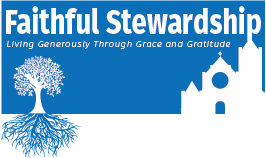Several remarkable things have happened during the two months I’ve been with the People of St. Andrew’s Cathedral and I want to make some remarks about some of them.
Electronic Mail – We use Constant Contact for our weekly e-news and any number of other communications with our members. Constant Contact provides us with metrics that help us understand how many people open emails, how many bounce, and how many emails are sent. Last week, The Epistle was emailed to 901 addresses, 368 of which actually opened the email. That’s a 42% open rate. While 100% would be better, Constant Contact tells us that 33% is a very good open rate. So, our members are above average in reading their emails. This tells me you are interested in what is happening at your church. That makes my heart glad.
Stewardship Campaign – 224 households have pledged to give $1,054,341 next year for God’s work through St. Andrew’s Cathedral. 69 pledges are new and 94 are increases in giving. Each pledge represents a commitment to God and God’s Church to engage in faithful stewardship as a spiritual discipline. The prompt and generous response is a sign of spiritual health.
Habitat for Humanity – On Wednesday of this week, the Staff and others from the Cathedral spent the day working on the house that four Episcopal churches are building on Greenview Street. During lunch, served by the Holy Smokers, our fearless and able leader, Thorne Butler, thanked everyone for participating and made some announcements. When he was finished, I asked him if he had full sign up sheets. He said, “Yes! In fact, we oversubscribed. There are even more people than we expected.” That’s an indication that members of the Cathedral community want to be engaged in Christ’s work in meaningful, life changing ways
Meals on Wheels – At a meeting of the newly revitalized Pastoral Care Commission, June Stevens reported that she has forty people who are participating in this important ministry. Forty! That is another indication that the members of the Cathedral community want hands-on engagement.
Newcomer Dinner – Thirteen people who are new to the Cathedral recently attended a lovely dinner at the home of Gayle and Holmes Adams. Several members of the vestry and staff, along with a wonderful group of hosts, were there to extend a generous and warm welcome. The newcomers left with a feeling that they have a place in this community of faith and the warm glow on the faces of all those who made the evening possible indicated that they knew they got their message across.
Women’s Book Study – If one more person shows up for the Women’s Book Study, they may have to move to the Parish Hall. They enjoy each other’s company and the lively discussion of some significant literature.
Men’s Ministries – I’ve tried unsuccessfully several times to start opportunities for men’s fellowship, including a Society of St. Andrew and something like the Dean’s List. I was impressed upon arrival at the Cathedral that we have both opportunities and they are thriving.
This is a community of Christians who enjoy one another’s company, look forward to opportunities to work, pray, give, and play together, and go out of their way to include everyone.
These are certainly not the only examples of congregational health, but I wanted to recognize them and call your attention to them in hopes of encouraging all our ministries and all our groups to keep up the good work because in so doing you are building up the Church and living in the spirit of the exhortation found in the Letter to the Hebrews, "Let us consider how to provoke one another to love and good deeds" (Hebrews 10:24).
The distinguished English church musician Percy Dearmer penned these stanzas that I think could be the theme song of St. Andrew’s Cathedral because they so beautifully describe the quality of common life the Holy Spirit is stirring up around here, at the Altar, at fellowship meals, in our study, caring for one another, and in service to our neighbors in need. Here is a setting by Harold Friedell sung by the Choir of Men and Boys at St. Thomas Church, Fifth Avenue, in New York City.
Draw us in the Spirit's tether;
For when humbly, in thy name,
Two or three are met together,
Thou art in the midst of them:
Alleluya! Alleluya!
Touch we now thy garment's hem.
As the brethren used to gather
In the name of Christ to sup,
Then with thanks to God the Father
Break the bread and bless the cup,
Alleluya! Alleluya!
So knit thou our friendship up.
All our meals and all our living
Make us sacraments of thee,
That be caring, helping, giving,
We may true disciples be.
Alleluya! Alleluya!
We will serve thee faithfully
Words: Percy Dearmer
Music: Harold Friedell
I’ll see you in Church!
The Very Reverend Ronald D. Pogue
Interim Dean
St. Andrew’s Episcopal Cathedral
Jackson, Mississippi
